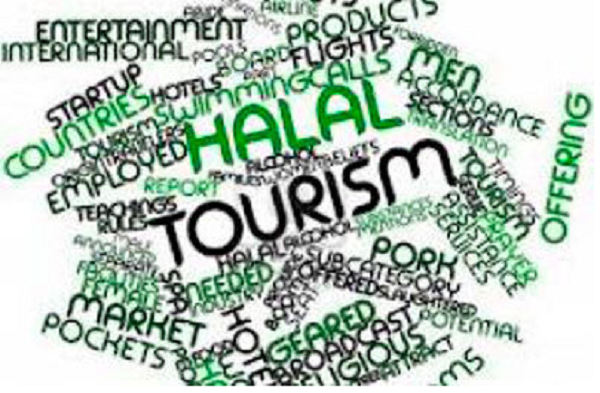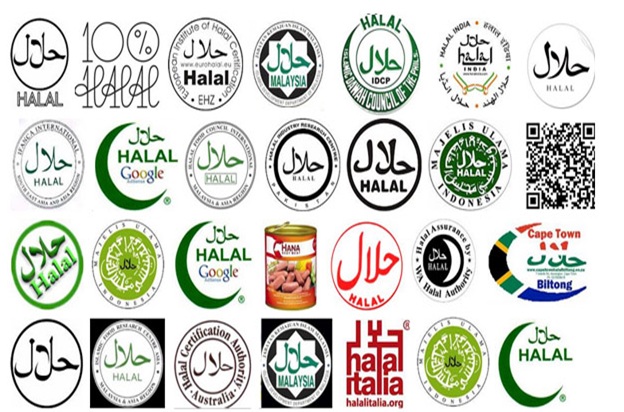
by admin | May 25, 2021 | Halal Food, Halal Industries, Muslim World
 Dubai : Malaysia has recognized the control system for halal food of the United Arab Emirates (UAE), as well as the latter’s national certificates and national halal mark.
Dubai : Malaysia has recognized the control system for halal food of the United Arab Emirates (UAE), as well as the latter’s national certificates and national halal mark.
Halal food is identified as without pork or animal fat or blood, while halal beverages can never contain alcohol. In order to get a halal certificate, the food must be guaranteed by qualified Islamic scholars, who can label the product as edible for Muslim consumers.
The Malaysian Department of Islamic Development, JAKIM, sent ESMA the official recognition certificate, after the UAE hosted a Malaysian delegation that reviewed the UAE Halal Control System Global Practices.
The recognition by the Southeast Asian state paves the way to facilitate the export of UAE halal products under the national brand and ensure their acceptance in Malaysian market, as well as 60 other markets that accept Malaysian halal certification.
“This UAE-led initiative, first of its kind in the Arab and Middle East world, will open up horizons to exporters in the country… especially for markets of East and Southeast Asia and the Australian continent,” said Abdullah Abdul Qader Al-Maeeni, Director-General of the Emirates Authority for Standardisation and Metrology (ESMA).
According to official reports, bilateral trade between the UAE and Malaysia amounted to 6.1 billion U.S. dollars, last year.
UAE’s exports to Malaysia amounted to 3.59 billion dollars.
—NNN-WAM

by admin | May 25, 2021 | Halal Industries

Saif Alam siddiqui
By Saif Alam Siddiqui, Maeeshat News: Over the past two decades, Halal has been transformed from an exclusive niche market for Muslim consumers into a dynamic global market phenomenon that shows every indication of playing a significant role in global trade in future years to come, the past decades have also witnessed a tremendous curiosity concerning Islam. Islam is not just a religion but a way of life, its unimaginable for a Muslims to give up their faith for the sake of relaxation, or even slightly loosen up. Muslims are more conscious of their believe whether its Halal food, Islamic banking or now Halal tourism for a Muslim he/she has to follow the permissible ways of Islam at any cost, in a nutshell Muslim should led a Halal way of life.
Traditionally this trend has been focused mainly in food, in their political and cultural contexts. Now Halal tourism is in trend and is welcomed by world second largest demography. To understand the growth and evolution of the Halal market, it is useful to focus on factors and forces that are evidently driving this market forward. From customer awareness to technological Innovations, the Halal market is continuously being influenced and driven to new levels of evolution.
Observant Muslims typically avoid alcohol and areas where there can be excessive nudity, like beaches and nightclubs. For women who adhere to Islam’s modest dress code, swimming can pose a challenge, that means resorts that offer gender-segregated beaches and pools would be Halal tourist destination.
It is noted that Muslim customers become sensitive to consume products and services which are Shariah compliant moreover, the awareness among Muslim increased to select Halal options for their needs from the options currently offered. Therefore, some non-Muslim destinations such as Japan, Philippines, and Brazil offered Muslim friendly options after analyzing the scenario as it was facing problematic by Muslim travelers. Recently there was good imitative taken by Chambers of Commerce in Japan and Philippine. Travel Agencies Association organized seminars to train the tourism industry to satisfy Muslim tourist needs. Moreover, prayer rooms are allocated at major airports and restaurants offer Halal Food.
Halal tourism is a subcategory of tourism which is tailor for Muslim demography the hotels in such destinations do not serve alcohol and have separate swimming pools and spa facilities for men and women. The Halal tourism industry also provides flights where no alcohol or pork products are served, prayer timings are announced, and religious programs are broadcast as part of entertainment offered on board.
As Islam is the fastest growing religion therefore there is a potential for boom in this sector, there is a future market for a Halal startup airline, which could provide Halal food, prayer calls, Qur’an in seat pockets and provide separate sections for male and female travelers, many international hotels do serve Halal food. Some hotels have also employed people from the Muslim world to provide translation services and other assistance that may be needed by tourists from Muslim countries.
It is not just manufactured Halal products or Islamic banking, Services such as Halal holidays are also booming. Let us analyze some fact figure which will crystal clear the scenario according to MasterCard-Crescent Rating Global Muslim Travel Index (GMTI), Halal tourism was worth USD 145 billion in 2014 and is expected to grow to USD 200 billion by 2020. In Britain alone, Muslim tourists spent 21 billion pounds last year and most were inbound tourists from the Middle East.
Muslim customers are one of the fastest developing market segments and their needs cannot be ignored by destination marketers and tourism operators. According to the Global Islamic Economy report, by Thomson Reuters in collaboration with DinarStandard, the global Muslim travel market was worth USD 140bn in 2014, which represents 11.5% of global expenditure. The same report also predicts that the segment is expected to be worth USD 238bn in 2019 and represent 13% of global expenditure. The tourism industry is increasingly competitive; therefore, innovation is one of the success factors in this huge market. The rapid growth of the Halal tourism industry not only gives birth to ‘Muslim-friendly’ or Halal friendly hotels, but also of specialized travel agencies which offer Halal holiday packages. Another episode is the emergence of specialized booking services; the largest of these is www.HalalBooking.com, which offers a specialized search and booking service for online customers concerned of Halal and looking for Halal trip or Halal vacations Furthermore, a number of consultancy firms have appeared which help companies to adapt to Muslim holidays or Halal holidays.
 It is expected that Halal tourism industry could be competitive in upcoming years. Destinations, hotels and resorts, airlines, and travel agents are recommended to position itself in Halal tourism market. The initiatives which are taken to make the destination Muslim friendly by some non-Muslim countries may motivate other destinations to be Muslim friendly. It is expected that worldwide global brands in hospitality Industry may address this opportunity. Furthermore, many countries and businesses in Asia Pacific region are expected to increase attention to Halal tourism and may start to take initiatives to be Muslim friendly. In Muslim minority countries such as India, Taiwan, Vietnam, China, and South Korea, Halal tourism is considered a good business opportunity.
It is expected that Halal tourism industry could be competitive in upcoming years. Destinations, hotels and resorts, airlines, and travel agents are recommended to position itself in Halal tourism market. The initiatives which are taken to make the destination Muslim friendly by some non-Muslim countries may motivate other destinations to be Muslim friendly. It is expected that worldwide global brands in hospitality Industry may address this opportunity. Furthermore, many countries and businesses in Asia Pacific region are expected to increase attention to Halal tourism and may start to take initiatives to be Muslim friendly. In Muslim minority countries such as India, Taiwan, Vietnam, China, and South Korea, Halal tourism is considered a good business opportunity.
One of effective means of accessing the market is to make Halal food widely available in the destination which is considered the high Priority for Muslim tourists. The so-called “Halal tourism” market was once seen as a niche revenue stream, limited to pilgrimages to Mecca only has become the multi-billion dollar-a-year revenue stream. But now there’s a movement in the tourism industry to widen the “Halal tourism” market to cater to Muslim travelers worldwide, particularly those from wealthy Gulf Arab states.
Malaysia, Turkey and many more countries are trying to attract Muslim tourists from all over the world offering facilities in accordance with the religious beliefs of Muslim tourists. Malaysia is aggressively seeking more Muslim tourists, promoting itself as Muslim-friendly Malaysia
Travelers from Saudi Arabia, Kuwait, Qatar, the United Arab Emirates, Bahrain and Oman spend USD 64 billion traveling this year and are expected to spend USD 216 billion by 2030, according to a research. The study found that, on average, a traveler from these countries spends around USD 9,900 per trip outside the Gulf, for Emiratis, the figure reaches upto USD 10,400.
(Saif Alam Siddiqui can be contacted at saifalam89@gmail.com)

by admin | May 25, 2021 | Halal Food, Halal Industries
 London, (IINA) – By 2030, Muslim consumers are expected to reach 26 percent of the global population, according to a new paper released by Euromonitor International, offering much opportunity for companies operating in this market.
London, (IINA) – By 2030, Muslim consumers are expected to reach 26 percent of the global population, according to a new paper released by Euromonitor International, offering much opportunity for companies operating in this market.
The Muslim population stands as the second-largest population and the fastest growing religion globally in 2015, and is projected to increasingly claim a bigger share of the world’s consumer spending.
Muslim consumers seek products that cater to their religious needs and comply with Islamic requirements: from halal production, process to halal labelling and packaging.
‘Doing Business in the Halal Market: Products, Trends and Growth Opportunities’ examines the specific challenges and opportunities present for a variety of products from food and beverages to beauty for key halal markets across the globe.
Given the rising purchasing power increased consumerism around the world, the white paper assesses the potential for businesses considering tapping into halal and Muslim consumer markets; helping them to understand halal certification and the demand for standardization across the food industry, and identify halal market opportunities in Southeast Asia, China, Western Europe and Australasia, (Australasia, a region of Oceania, comprises Australia).
While provision of halal goods used to be localized and depended greatly on personal sourcing, or restricted to certain Muslim-integrated areas, “globalization is resulting in a need for halal provisions to be made available more conveniently”, said Emil Fazira, food and nutrition research analyst at Euromonitor.
“Major companies adhering to mainstream trends are increasingly facing demand from Muslim consumers mainly the young and able to spend who are also interested in the latest consumer trends.”

 Dubai : Malaysia has recognized the control system for halal food of the United Arab Emirates (UAE), as well as the latter’s national certificates and national halal mark.
Dubai : Malaysia has recognized the control system for halal food of the United Arab Emirates (UAE), as well as the latter’s national certificates and national halal mark.


